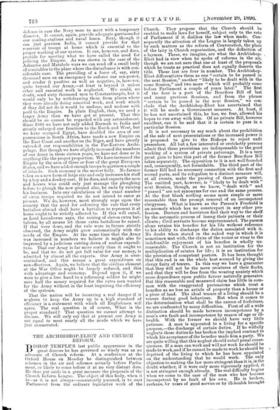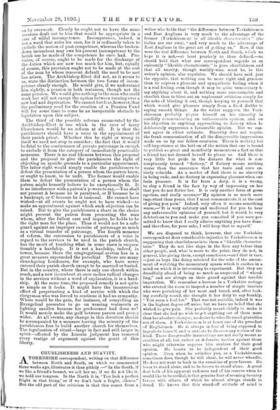THE ARCHBISHOP-ELECT AND CHURCH REFORM.
ISHOP TEMPLE'S last public appearance in the great diocese he has governed so wisely was as an advocate of Church reform. At a conference at the Oxford House on Monday he distinguished. between schemes in the air and schemes actually before Parlia- ment, or likely to come before it at no very distant date. He thus put aside in a great measure the proposals of the Church Reform League. The object of this body, when it is—as it is not always—consistently pursued, is to oust Parliament from the ordinary legislative work of the Church. They propose that the Church should be enabled to make laws for herself, subject only to the veto of Parliament if it dislikes the law when made. Con- sequently the attention of the League is largely taken up by such matters as the reform of Convocation, the place of the laity in Church organisation, and the definition of a layman. These, we imagine, are what the Archbishop Elect had in view when he spoke of reforms in the air, though we are not sure that one at least of the proposals which he treats as practical does not equally deserve the title. These last are four in number. The Archbishop Elect differentiates them as one "certain to be passed in the next Session," another "likely to be dealt with in the same Session," and two more "which will probably come before Parliament a couple of years later." The first of the four is a part of the Benefices Bill of last and many previous Sessions, and from the phrase "certain to be passed in the next Session," we con- clude that the Archbishop-Elect has ascertained that it will be made a Government measure. At least, if he has not ascertained this, he has, we fear, allowed his hopes to run away with him. Of no private Bill, however excellent, can it be said that it is certain to pass in a particular Session.
It is not necessary to say much about the prohibition of the sale of next presentations or the increased power it is proposed to give to the Bishops to reject unfit presentees. All but a few interested or crotchetty persons admit that these provisions are indispensable to the good working of a system of private patronage. It is a very great gain to have this part of the former Benefices Bill taken separately. The opposition to it is not well founded and, consequently, not formidable. The third part of the former Bill had no necessary connection with the first and second parts, and its relegation to a distinct measure will, at all events, make the passing of those parts easier.
The omitted part, however, is "likely to be dealt with" next Session, though, as we know, "dealt with" and " passed " are not synonyms for one and the same process. At the first blush nothing seems more simple or more reasonable than the prompt removal of an incompetent clergyman. What is known as the Parson's Freehold is an anomaly which has no counterpart in any other pro- fession. Doctors and barristers find their way to the shelf by the automatic process of losing their patients or their clients ; Civil servants become superannuated. The parson alone retains his benefice for his life without reference to his ability to discharge the duties associated with it No doubt when stated in the naked way in which it is sometimes met with, the claim of the rector or vicar to the indefeasible enjoyment of his benefice is wholly un- reasonable. The Church is not an institution for the multiplication of estates for life ; it is an institution for the provision of competent pastors. It has been thought that this end is on the whole best seemed by giving the clergy fixity of tenure. In this way we have a guarantee that they will not be the mere creatures of their flocks, and that they will be free from the wearing anxiety which mere dependence upon public favour naturally generates. But this reasonable and measured. claim has little in com- mon with the exaggerated pretensions which treat a benefice as no less an article of property than a house or a piece of land. The ideal tenure of a living should be a tenure during good behaviour. But when it comes to the determination what shall be the causes of forfeiture, we are confronted by many difficulties. First of all a wide distinction should be made between incompetence by a man's own fault and incompetence by reason of age or ill- health. With the former we should have very little patience. A man is appointed to a living for a specific purpose,—the discharge of certain duties. If he wilfully neglects those duties he has broken the implied contract to which his acceptance of the benefice made him a party. We are quite willing that this neglect should entail penal conse- quences. If a man can work and will not work he should be made to work, and if he cannot be made to work he should be deprived of the living to which he has been appointed on the understanding that he would work. The only objection to making the law more stringent than it is, is the doubt whether, if it were only more vigorously applied, it is not stringent enough already. The real difficulty begins when we come to the case of the man who has become incompetent by no fault of his own. He is broken, perhaps, by years of good service or by ill-health brought on by overwork. Clearly he ought not to have the same measure dealt out to him that would be appropriate in a case of wilful incompetence. Incompetence, indeed, is not a word that suits his case, for it is ordinarily taken to exclude the notion of past competence, whereas the broken- down incumbent may owe his present incompetence to the lavish use he made of the competence he once had. Pro- vision, of course, ought to be made for the discharge of the duties which are now too much for him, but, equally of coarse, this provision ought not to be made at the cost of the man by whose innocent default the need to be met has arisen. The Archbishop-Elect did not, as it seems to us, state the distinction between the two forms of incom- petence clearly enough. He would give, if we understand him rightly, a pension in both instances, though not the same pension. We would give nothing to the man who could work but will not except the option between turning over a new leaf and deprivation. We cannot but fear, however, that the preliminary need for the creation of a Pension Fund will for some time to come be an insuperable obstacle to legislation upon this subject.
The third of the possible reforms enumerated by the Archbishop-Elect is one which in the eyes of many Churchmen would be no reform at all. It is that the parishioners should have a. voice in the appointment of their parish priest. Whether this be right or wrong in itself we need not stop to consider; the fact that it would be fatal to the continuance of private patronage is enough to exclude it from the category of immediately practicable measures. There is no real likeness between this proposal and the proposal to give the parishioners the right of objecting on specific grounds to a particular appointment. The latter right would simply enable the parishioners to defeat the presentation of a person whom the patron knew, or ought to know, to be unfit. The former would enable them to defeat the presentation of a person whom the patron might honestly believe to be exceptionally fit. It is no interference with a patron's p)wers to say,—You shall not present A because he is paralysed, or B because he is a bankrupt, or C because he is immoral. He cannot have wished—at all events he ought not to have wished—to make an appointment against which such objection can be raised. But to give the parishioners a share in the choice might prevent the patron from presenting the man whom, after the fullest care and inquiry, he holds to be the right man for the place. Thus it would not be a safe- guard against an improper exercise of patronage so much as a virtual transfer of patronage. The fourth measure of reform, the concession to parishioners of a voice in regard to the services to be used in the parish church, has the merit of touching what in some cases is unques- tionably a hardship. It is not a hardship, indeed, in towns, because there the congregational system has in a great measure superseded the parochial There are many churchgoing Londoners, for example, who have never entered their parish church except to be married or buried. But in the country, where there is only one church within reach, and a new incumbent at once makes radical changes in the services without a word of explanation, it is a hard- ship. At the same time, the proposed remedy is not quite so simple as it looks. It might have the inconvenient effect of perpetuating a kind of service with which the clergyman who was forced to continue it had no sympathy. Where would be the gain, for instance, of compelling an Evangelical presentee to go on wearing vestments or lighting candles because his predecessor had done so!. It would merely make the gulf between parson and peopLe wider. At all events, any change in this direction should be accompanied by a measure leaving the minority of the parishioners free to build another church for themselves. The legalisation of ritual—large in fact and still larger in spirit—effected by the Lincoln judgment has removed every vestige of argument against the grant of this liberty.











































 Previous page
Previous page